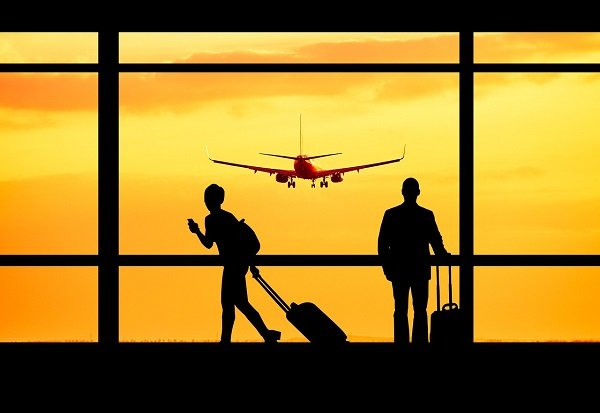Even though airports and central bus stations give an impression of security, they are constantly targeted by opportunistic and highly skilled criminals, and theft is their preferred method of action. These individuals can operate as lonely agents but are often seen in gangs that act in a discrete and coordinated fashion.
The main factors of attraction for the thieves are distraction, and the presence of an interesting object, which can be a wallet, a cell phone, a suitcase or even an entire luggage cart full of baggage.
The thefts are normally committed by two individuals during the rush hour in the airports, from 5h to 10h and from 18h to 23h. They pretend to be passengers and wear expensive clothes, carry suitcases or backpacks, and sometimes walk with a passport on the hand. This is part of their technique to go unnoticed by security forces and their victims.
According to data provided by public security forces, thieves often attack in places where travelers must split their attention: near ATMs, in food courts, near self-service check-in kiosks, and at check-in queues. However, many come by plane or manage to illegally access the departures/arrivals area, thus they can attack in these spaces as well, particularly in the luggage carousel or inside the free shop. Finally, when passengers are waiting for a taxi is another moment in which criminals like to act. The outside of the airport or central bus station may be crowded, and there can be moments when travelers will turn their backs to the luggage to talk to a taxi driver or to place a piece of baggage in the car trunk, these are great opportunities for the thieves.
Competent thieves remain completely “under the radar” and can stay for several minutes near their victims’ belongings until they find the right moment to steal and escape. A few techniques include slowly moving away with the feet suitcases or other object left on the floor by the victim, until it is distant enough for the criminal to pick it up. They can also replace the backpack from a traveler for another similar item and flee. Furthermore, a distraction event can be set up by the criminals’ partners, while another team subtract the belongings.
Similarly, the events described above can happen at hotels or other hosting facilities. The reception halls are quite sensitive areas, but lowering your awareness in other areas, can also result in losses. Thefts have been continuously reported in common spaces, like the pool area and restaurants.
The recommendations below can reduce exposure to risks during trips:
- Preparing for the Trip
• Inform yourself about certain control procedures: immigration, customs.
• Prefer suitcases with rigid exteriors and password padlocks integrated with the case.
• If the suitcase does not have an integrated padlock, select one with password that is TSA approved.
• Prefer to use colorful suitcases, as they are easy to spot. Stickers and tapes can help to identify those that are more discrete.
• Attach tags with your name to the baggage.
• Don’t place in your luggage a sticker that has the name of your company.
• Personal documents, money, and electronics must be carried in the cabin bag.
• Keep the invoice of precious items that are inside the bags, so you can request the insurance reimbursement in case of loss. - Embarking
• Anticipate delays due to security control when leaving the country.
• Just after arriving at the airport, wrap the luggage in plastic film.
• Don’t wait in the public area of the airport. Beware of strangers requesting your attention.
• Don’t waste time until you accomplish your check-in.
• Don’t waste time until you pass through customs. Being nervous and in a hurry can reduce your alertness, then you become an easy target.
• Submit to every verification demanded by the authorities, even if they sound absurd. Be cooperative and friendly. - Disembarking
• After disembarking, go straight for the baggage carousel. After retrieving the bag, check for anything suspicious, such as a sign of forced opening.
• Upon arrival avoid Uber and similar Apps. Always prefer taxis that belong to companies that have a stand in the airport.
• Don’t withdraw money from ATMs in airports. - All the time
• Never leave your luggage and other belongings unattended. Keep them always at sight. If you go to the toilet, take the luggage with you.
• Never carry any baggage that is not yours or whose contents you are unaware of.
• Remain discrete about your life and professional activities.
• Avoid exposing valuable items in public areas: luxury watches, electronics, cell phones, jewels etc. - Data Security
• Avoid dedicated notebook bags.
• Attention to public Wi-Fi networks. Prefer a 4G connection.
• Never connect directly to public Wi-Fi at airports, hotels, etc. There may be spoof Wi-Fi hotspots which transmit a malicious connection that mimics the expected network.
• Always use an encrypted VPN and ensure that you have a HTTPS connection.
• Only use encrypted flash drives/USB sticks and keep careful control over their location.
• Avoid carrying confidential information in your devices (laptop, phone, USB key) when travelling to countries where border officials can seize laptops and other digital media for inspection.
• Take clean devices configured for travelling.
• Alternatively, do a device cleansing and remove all unnecessary data before your travel and prefer downloading the information from the cloud through an encrypted VPN at arrival. - At the hotel
• At the hotel, when checking-in and checking-out, remain always with your belongings.
• This advice serves for other common areas, such as the pool.




